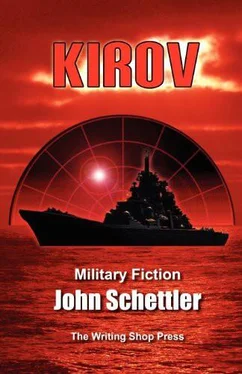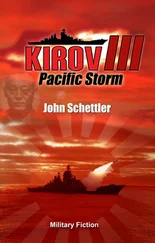John Schettler - Kirov
Здесь есть возможность читать онлайн «John Schettler - Kirov» весь текст электронной книги совершенно бесплатно (целиком полную версию без сокращений). В некоторых случаях можно слушать аудио, скачать через торрент в формате fb2 и присутствует краткое содержание. Жанр: Фантастика и фэнтези, Альтернативная история, на английском языке. Описание произведения, (предисловие) а так же отзывы посетителей доступны на портале библиотеки ЛибКат.
- Название:Kirov
- Автор:
- Жанр:
- Год:неизвестен
- ISBN:нет данных
- Рейтинг книги:5 / 5. Голосов: 1
-
Избранное:Добавить в избранное
- Отзывы:
-
Ваша оценка:
- 100
- 1
- 2
- 3
- 4
- 5
Kirov: краткое содержание, описание и аннотация
Предлагаем к чтению аннотацию, описание, краткое содержание или предисловие (зависит от того, что написал сам автор книги «Kirov»). Если вы не нашли необходимую информацию о книге — напишите в комментариях, мы постараемся отыскать её.
Kirov — читать онлайн бесплатно полную книгу (весь текст) целиком
Ниже представлен текст книги, разбитый по страницам. Система сохранения места последней прочитанной страницы, позволяет с удобством читать онлайн бесплатно книгу «Kirov», без необходимости каждый раз заново искать на чём Вы остановились. Поставьте закладку, и сможете в любой момент перейти на страницу, на которой закончили чтение.
Интервал:
Закладка:
But Mother Russia was a sick old woman now, and could not afford the blue water navy she had always dreamed of. In the year 2021, the country was a strange patchwork of conflicting influences. In the big cities, there was still wealth, consumerism, along with all the ills of modernity-advertising, financial crime, corruption in government and politics. The country had opened itself to Western commerce and culture, but was still harried by a lingering state of mind that could only be described as paranoid suspicion. The Kremlin too often found foreign fingerprints on any crisis, and in a country where political and historical reality was a construct of words more than deeds, it was too easy to foist off the failures of government and Russian society as a whole on unfriendly outside influences.
When the great financial crisis fell on the world between 2008 and 2015, it was said that the Americans created the crisis as a means of destroying Russia, and America was to blame for every ill that now beset the nation. It was almost a reflexive reaction to adversity at times, this propensity to blame anyone other than one’s self, and it extended right up through the whole system to the highest levels of government.
When a TU-134 jet went down near Petrozavodsk, killing 47 passengers, the incident was first blamed on Chechen terrorists, then on faulty aircraft parts obtained from a foreign manufacturer. Nothing was said of the pilot, Anton Atayev, who was drunk as he piloted the plane that day. Later it was whispered that Anton had only turned to vodka to soothe the pain of his divorce, and that his wife had betrayed him-again foisting the real problem off on someone else. Too many Russian men were still like Gogol’s “lost souls,” mired in their own self-indulgent and complacent mediocrity, a condition described by the untranslatable Russian word poshlost. They muted the pain of their lives with vodka, and took out their simmering frustrations on their women, who were often the victims of abuse. Excuses were easy to come by in Russia-reasons, justifications, stories put forward to rationalize any ill. Anton was just a victim of an unfaithful wife, that was all, it was whispered. She should be beaten, or worse, and reminded of her place.
The words became a balm, and a means of dismissing the crushing problems of daily life, whether they were true or not. Yet in spite of their sad and degrading lot, deep down, Russians still took great pride in their heritage and roots, just as Moscow still clung to the vestige of its history in the aging architecture of earlier times, the gold domes and minarets of the Kremlin still gleaming in the wan light on the cold winter days. Now the city again had a brooding military hue at times, and the winters there were no less cold and harsh in spite of the brief warmth of Glasnost with the West that had brought capitalism to the heart of the nation.
The farther you went from the big cities, however, the more you came to feel you were still trapped in that older world, in the old fallen Soviet state where nothing of value had ever been born. Volsky remembered that last long train ride he had taken from Moscow to his base at Severomorsk. The small villages and towns were still struggling to make the transition away from communism and define a new way of life. The rusting infrastructure of the old Soviet regime was still there. Old manufacturing towns that were once centered on a worker’s kollectiv, a state farm, a factory, a shipyard, were now like failed industrial ghost towns. People struggled for the barest necessities of life and to simply secure those few things that could provide a little comfort, safety and stability for their family-food and shelter.
Thankfully, he no longer had to concern himself with those struggles. His position as Admiral of the Fleet came with certain privileges, and enough for him to keep his family and aging parents comfortable enough in St. Petersburg. He had secured his post through long years of service and hard work, however, and a stoic acceptance of the creaking machinations of the system the navy had become-a clear reflection of the decrepit state of the nation as a whole.
Politically, Russia was still fundamentally irrational at heart. It had moved from autocracy, to revolution, to empire and then into rapid decline, a fall so dark and bleak that the nation struggled to hold onto the barest hint of its old glory, prompting many to long for the old days of Soviet discipline and power. Corruption in government was everywhere apparent, yet never really challenged by any countervailing authority. A new lie was broadcast each day to justify all those that came before it, and this aching nostalgia for a time when Russia had once been a great and mighty world power was a way to forget the lies, and turn a blind eye on the corruption.
Fraud and bribery were old and familiar habits in the system. Enforcement of laws was arbitrary, and often rested on a network of complex relationships-in groups, out groups, favored sons-the blat that held the system together. Anything that got done was usually done poblatu, using blot to grease the way.
Prestige was just as important as power, and pride that had become a tainted hubris was still at the heart of the Russian psyche as well. The people endured, for if they could not easily expect a time when things might be better, they could almost always remember a time when they were worse. People lived with their broken system, lived in it, worked in it, struggled on in spite of it, and this fear that everything might again get so much worse was always at the heart of the fear in every Russian’s soul.
Getting anything done in this environment required guile, blat, and more than a little babki in the right palms, the monetary bribes that would seal deals and open doors. Vodka was a second currency in the country, and people literally traveled with cases of the stuff in the trunks of their cars-those lucky enough to even have a personal vehicle. Thankfully, Volsky had avoided the blight of vodka in his own life. He drank, as virtually all Russian men did, but was able to impose his basic rule of thumb in life on those habits-moderation in all things. Yet, vodka could be traded for gasoline, food, a night’s lodging, or special favors that might untangle the Gordian knots of local administrative districts, or bypass overly curious authority figures, and the Admiral was fond of giving it as a gift when appropriate. The system was long entrenched, a way of life, and no one avoided the necessities of blat and babki in Russia, no matter how high they had climbed.
In many ways, the blat provided by friends and favors was often more important than cash. Rubles could buy you a meal today, but friends and the right connections could feed you for a lifetime, so it was said that it was better to have a hundred friends than a hundred rubles. Yet this system of installing people in key posts due to affiliation had a blowback in the sad fact that many positions soon became filled by people who were simply incompetent. And once there, they held on to jobs stubbornly because they never knew if they would ever find another one. They were stuck to their chairs with blat, not because of any particular merit or skill they possessed.
Rudnikov, the Captain of the Orel, was a perfect example, thought Volsky. He was old, and tired, and rusty like his submarine. He should have been replaced by a younger man years ago. There were enough of them out there in the ranks, eager for promotion and a way up the gangways to a more comfortable place of power and privilege. Rudnikov was stuck in his post just as Russia itself seemed mired in its own systemic incompetency.
As she completed the second decade of the twenty-first century, Russia was still a nation still struggling up off her knees, a population deeply distrustful of authority, but who nonetheless submitted to it for fear of change and the uncertainty that is at the very heart of that process. Change was uncomfortable, except for the very young, and always went hand in hand with the notion of threat and instability. So the Russians adapted, and they endured the hard change of recent years, always hoping for better times, but always expecting things to get worse.
Читать дальшеИнтервал:
Закладка:
Похожие книги на «Kirov»
Представляем Вашему вниманию похожие книги на «Kirov» списком для выбора. Мы отобрали схожую по названию и смыслу литературу в надежде предоставить читателям больше вариантов отыскать новые, интересные, ещё непрочитанные произведения.
Обсуждение, отзывы о книге «Kirov» и просто собственные мнения читателей. Оставьте ваши комментарии, напишите, что Вы думаете о произведении, его смысле или главных героях. Укажите что конкретно понравилось, а что нет, и почему Вы так считаете.












